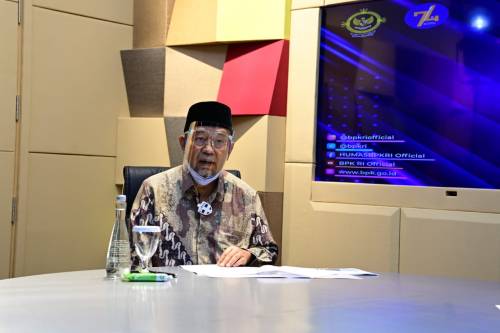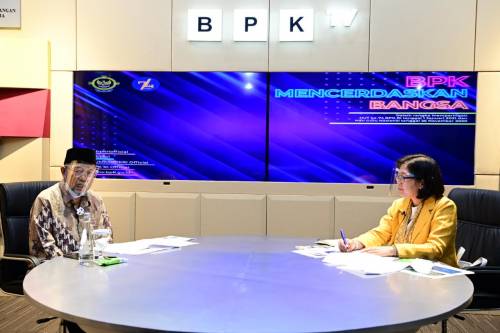An Educative Webinar, BPK Educates Smart Nation

JAKARTA, BPK Public Relations - As part of the series to commemorate the 74th Anniversary of the Audit Board of the Republic of Indonesia (BPK) along with the National Teachers Day, BPK organized an educative webinar, BPK Educates Smart Nation, that carried a theme “Accountability for All” on Thursday (26/11/2020).
The educative webinar presented the Vice Chairman of BPK, Agus Joko Pramono, as the keynote speaker and the Board Member VI of BPK, Harry Azhar Azis,and the Minister of Education and Culture, Nadiem Anwar Makarim, as the resource person. The webinar was moderated by the Director of Public Relations and International Cooperation Bureau of BPK, Selvia Vivi Devianti.
The Secretary General, Bahtiar Arif, along with the high-level officials and the employees of BPK attended the educative webinar that attracted as many as 1500 participants. Among these participants were the heads and the students of diverse higher education institutions in Indonesia.
In his presentation, the Vice Chairman said that the accountability for all as the theme of the webinar was a big theme agreed by all board members that was established and promoted to underline all activities carried out in the BPK. Subsequently, the meaning of accountability could be deepened and enlarged, comprised not only the narrow meaning of accountability as in the state financial management and accountability, but also the accountability as a value and culture immersed and developed in everyday life as part of the society, the nation, and the state.

"The selected Accountability for All theme of the educative webinar, BPK Educates Smart Nation, is to emphasize that value of accountability is not solely either the state finance officer responsibility or the state finance auditor responsibility, but all of us are responsible for the accountability. The responsibility that all of us should bear and build as a culture immersing into ourselves, then, to be applied in our everyday life in the society," the Vice Chairman said.
The Vice Chairman further explained that BPK would be having 100th anniversary by 2045, the year that was often referred as the window of demography in which the productive population with age of 15-64 years old would be more than the non-productive population.
He added that the productive population was predicted to be growing to reach 70% of the total population in Indonesia from 2020 to 2045, then, the population might carry two possible impacts, either the demography bonus or the demography deficit.

The demography bonus would be achieved if the human resources met an adequate required quality and competency that resulted in the added value of sufficient capability and capacity in which they might generate impacts on the economic growth of the country.
"On the contrary, the demography deficit will occur if, despite of the productive age, the population have no adequate required quality and competency, then,as the consequence, the mass employment will arise and be a burden hindering the development of the country," the Vice Chairman explained.
The Vice Chairman explained that a big dream and wish for 2045 would be the Gold Indonesia in which the country with mastery of competencies would compete with other countries in the world while, at the same time, fix its own bases issues occurring in the country thoroughly.
"The key to achieve the Gold Indonesia in 2045 lays on the quality of its human resources, young generation of both men and women in particular," he said.
The Vice Chairman mentioned that the young men and women in the country that currently were in the schools, colleges, or universities might become the first upholders and guardians of the country by the following 30 years. Therefore, these young generations should improve their quality and competency to be the best role models of the country to achieve the national goals, establishing welfare, justice, and prosperity for all the people of Indonesia.

The demography bonus that was parallel with the quality of human resources certainly would accelerate the development progress in Indonesia and empower the country to realize the Gold Indonesia in 2045. The needs to improve the quality of human resources, in one part, depended on the national education system.
"The good education system is not merely focusing on the social science knowledge, but the moral knowledge is equally important and necessary to build human resources with not only competence skills and capabilities but also acceptable well conducts and ethics," the Vice Chairman elaborated.
In addition, the Vice Chairman mentioned that the BPK committed to take strategic roles in supporting and improving the government to implement its policies and strategic developments as formulated and stated in the National Medium-Term Development Plan (RPJMN).
"BPK always, in its best efforts, conducts audits with high quality and benefits to promote the improvement on the state financial management and accountability. When a good and sound state financial management and accountability is set, not only will the public services be better, but also the national goals will be achievable," he mentioned.
"Through the audit, the BPK prudently guards and ensures that the national development priority programs are planned, executed, and reported transparently and accountably, so that the society may take the most benefits of the programs to improve the welfare," he added.

The year of 2020 was recognized as the beginning year to execute the 2020-2024RPJMN, therefore, the BPK conducted the audits based on the 2020-2024 BPK Strategic Plan, that was formulated in reference to the 2020-2024 RPJMN, as well as considered the implementation of the Sustainable Development Goals (SDGs) in each of the national development agenda.
"In determining the object and focus of the audit, the BPK aligns the audit theme with the national development agendas through the national thematic audits, the regional thematic audits, and the other significant relevant audits," he said.
